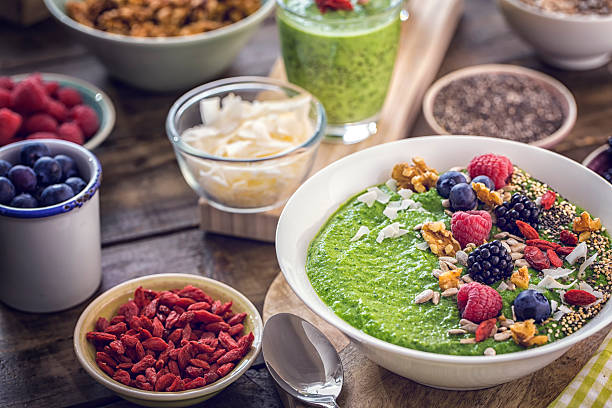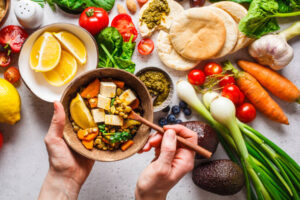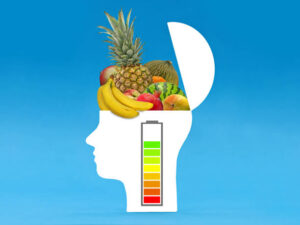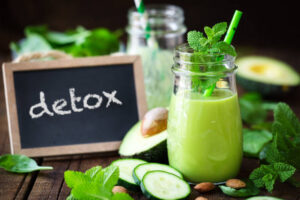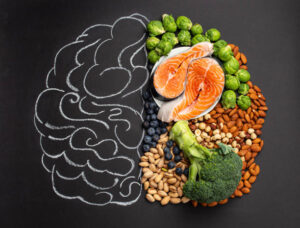Living a vegan lifestyle is more than just a diet—it’s a choice for health, sustainability, and compassion. However, as a professional vegan expert and someone who has embraced this lifestyle for years, I often get asked: “What are the best vegan superfoods, and how do they benefit my health?”
The good news is that a plant-based diet is packed with nutrient-dense superfoods that can transform your well-being. According to research by Harvard Health, diets high in plant-based superfoods can reduce the risk of chronic diseases by up to 25%.
What Are Vegan Superfoods?
Vegan superfoods are nutrient powerhouses that pack various vitamins, minerals, and antioxidants into every bite. They’re often low in calories but incredibly high in nutrients, making them an ideal addition to any diet. Superfoods like chia seeds, kale, and blueberries aren’t just trendy—they’ve been scientifically proven to enhance health, reduce the risk of chronic diseases, and even improve mental clarity.
Why Superfoods Are Essential for Vegans
Vegans need to be strategic about their nutrition to ensure they’re getting enough protein, healthy fats, and key vitamins like B12, iron, and omega-3 fatty acids. Superfoods help fill these gaps naturally, ensuring your body thrives on plant-based goodness.
The Top 10 Vegan Superfoods to Supercharge Your Health
1. Chia Seeds: The Nutrient-Dense Powerhouse
Don’t let their small size fool you—chia seeds are nutritional giants. These vegan meals are packed with omega-3 fatty acids, which are essential for brain health, reducing inflammation, and maintaining a healthy heart.
Chia seeds are also a great source of dietary fiber, aiding digestion, stabilizing blood sugar levels, and keeping you full for hours. Plus, they offer plant-based protein, making them ideal for vegans looking to meet their protein needs.
How to Use:
Make a chia pudding by mixing chia seeds with almond milk and a dash of maple syrup. Let it sit overnight, and voilà—a delicious, nutrient-packed breakfast! I started adding chia seeds to my smoothies during marathon training. The energy boost was incredible, and I never felt weighed down.
2. Quinoa: The Vegan Protein Superstar
Quinoa stands out because it’s a complete protein, containing all nine essential amino acids the body can’t produce. It’s also rich in magnesium, a mineral that supports muscle function, combats stress, and enhances sleep quality. Additionally, quinoa provides a hearty dose of fiber, which aids digestion and promotes a feeling of fullness.
How to Use:
Swap rice for quinoa in your stir-fries or use it as a base for a vibrant Buddha bowl.
3. Kale: The Nutritional Powerhouse Green
Kale is one of the most nutrient-dense vegetables, loaded with vitamins A, C, and K. These vitamins promote glowing skin, a robust immune system, and strong bones.
Its antioxidant content helps combat inflammation, which is at the root of many chronic diseases. Kale is also a great source of calcium for vegans, supporting bone health without dairy.
How to Use:
Massage kale with olive oil and lemon juice to create a tender, nutrient-packed salad.
4. Spirulina: The Green Protein Machine
Spirulina, a type of blue-green algae, is often called one of the most nutrient-dense foods on Earth. Just one tablespoon contains 4 grams of protein, along with significant amounts of B vitamins, iron, and essential amino acids. It’s particularly beneficial for vegans looking to boost their iron intake, which prevents fatigue and anemia.
How to Use:
Add a teaspoon of spirulina powder to your morning smoothie. It might turn your drink green, but the health benefits are worth it!
5. Avocado: The Heart-Healthy Fat Hero
Avocados are a creamy, delicious source of monounsaturated fats that support brain health and lower bad cholesterol levels. They’re also packed with potassium, which helps regulate blood pressure, and vitamin E, a powerful antioxidant that promotes healthy skin.
How to Use:
Spread mashed avocado on whole-grain toast, sprinkle with nutritional yeast, and add a pinch of chili flakes for a delicious snack.
6. Sweet Potatoes: The Energy-Boosting Carb
Sweet potatoes are nature’s gift to plant-based eaters. They’re rich in beta-carotene, an antioxidant that the body converts into vitamin A, supporting eye health and immunity. They also provide complex carbohydrates, which deliver steady energy without blood sugar spikes.
How to Use:
Cut sweet potatoes into wedges, toss them with olive oil, paprika, and garlic powder, and roast at 400°F until crispy. These make a perfect side dish or snack as nutritious as satisfying.
7. Almonds: The Versatile Nutrient Booster
Almonds are packed with magnesium, which supports nerve and muscle function, and vitamin E, an antioxidant that protects your cells from damage. They’re also a great source of plant-based healthy fats, which contribute to heart and brain health.
How to Use:
Keep a handful of almonds in your bag for an on-the-go snack. Alternatively, use almond butter as a spread on toast, or make your almond milk for smoothies and lattes.
8. Blueberries: The Antioxidant Titan
Blueberries are tiny but mighty, loaded with antioxidants called anthocyanins that fight free radicals and protect your cells from damage. They’re also high in vitamin C and fiber, making them excellent for skin health, digestion, and immunity.
How to Use:
Sprinkle blueberries onto oatmeal, yogurt, or pancakes for a burst of natural sweetness. You can also blend them into a smoothie with banana and spinach for a refreshing and nutritious drink.
9. Turmeric: The Golden Healer
Turmeric has long been prized for its medicinal properties, thanks to curcumin, its active compound. Curcumin is a powerful anti-inflammatory and antioxidant that supports joint health, boosts immunity, and may even reduce the risk of chronic diseases like heart disease and cancer.
How to Use:
Stir a teaspoon of turmeric into soups, stews, or curries for a warming, earthy flavor. For a soothing drink, make golden milk by mixing turmeric, cinnamon, and a touch of black pepper into heated almond milk. Black pepper enhances the absorption of curcumin, maximizing its benefits.
10. Dark Chocolate (70% or Higher): The Sweet Antioxidant Treat
Dark chocolate isn’t just a treat—it’s a superfood packed with flavonoids and antioxidants that improve heart health and brain function. It’s also a natural mood booster, thanks to compounds that stimulate the release of endorphins.
How to Use:
Enjoy a square or two of dark chocolate as an afternoon pick-me-up, or chop it into chunks and add it to vegan cookies or trail mix for a delicious snack. Choose varieties with 70% cocoa or higher for the most health benefits.
How to Incorporate Vegan Superfoods into Your Diet
The best part about vegan superfoods is their versatility. Here are some tips to help you make them part of your daily meals:
- Smoothies: Blend chia seeds, spirulina, and blueberries for a supercharged breakfast.
- Bowls: Create colorful Buddha bowls with quinoa, kale, sweet potatoes, and avocado.
- Snacks: Keep almonds and dark chocolate on hand for quick, nutrient-packed snacks.
Benefits of Vegan Superfoods for Your Health
Vegan superfoods are powerful allies in achieving optimal health. Packed with essential nutrients, they promote overall wellness and vitality. Here’s how these nutrient-dense foods can transform your health:
- Boosted Immunity
Vegan superfoods contain essential vitamins and antioxidants that strengthen the immune system. Regular consumption of these superfoods can keep your body resilient year-round.
- Improved Energy
For those seeking sustained energy throughout the day, vegan superfoods are invaluable. Including these foods in your meals ensures you stay energized, even during your busiest days.
- Better Digestion
Gut health plays a vital role in overall well-being, and vegan superfoods are a rich source of digestive-friendly nutrients. A diet rich in these superfoods helps maintain a healthy and efficient digestive system.
- Enhanced Heart Health
Heart health is a cornerstone of overall wellness, and many vegan superfoods contribute to cardiovascular function. These superfoods can significantly lower the risk of heart disease and improve overall cardiovascular health.
- Better Skin and Hair
Vegan superfoods also promote radiant skin and strong, healthy hair. These vegan superfoods provide the nutrients needed for glowing skin and lustrous hair.
- Weight Management
Maintaining a healthy weight becomes easier with the inclusion of vegan superfoods in your diet. These foods provide essential nutrients without adding excess calories, making them ideal for sustainable weight management.
- Improved Mental Clarity
Certain vegan superfoods support cognitive function and mental health. Adding these superfoods to your diet can enhance focus and productivity while promoting a positive mood.
- Reduced Inflammation
Chronic inflammation can lead to various health issues, but vegan superfoods can help combat it naturally. These superfoods not only address current inflammation but also protect against long-term health issues.
FAQs About Vegan Superfoods
Q1: What makes a food a “superfood”?
A: Superfoods are nutrient-dense and provide significant health benefits in small amounts.
Q2: Can I eat too many superfoods?
A: While superfoods are healthy, balance is key. Overeating any food, even superfoods, can lead to imbalances.
Q3: Are vegan superfoods expensive?
A: Not always! Affordable options include sweet potatoes, kale, and almonds. Buying in bulk or sourcing locally can also save money.
Q4: Do superfoods replace a balanced diet?
A: No, superfoods should complement a diverse diet. Balance and variety are essential for optimal health.
Q5: Where can I find vegan superfoods?
A: Most supermarkets carry superfoods like quinoa, chia seeds, and kale. For specialty items like spirulina, try health food stores or online retailers.
Conclusion
Incorporating vegan superfoods into your diet can significantly enhance your health, from boosting energy and immunity to supporting heart and brain function. Start by adding just one or two superfoods to your meals this week, and feel the difference as your body thrives.
Ready to take the next step? Dive deeper into transitioning to a plant-based lifestyle with our guide: How to Go Vegan: A Comprehensive Guide for Beginners. Your journey to a healthier, more vibrant you begins now!

